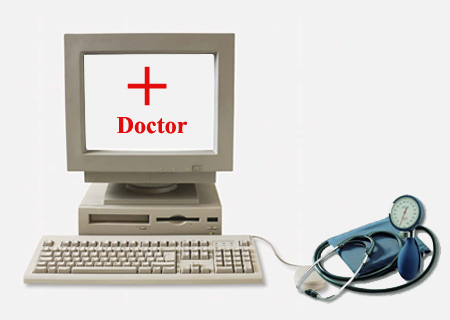Looks like God of the Internet is showering blessings for good health. While there is already a news of how internet has helped Kentuckians have good health, there is yet another study proving how a new online care for hypertension really works.
The ‘e-BP’ (Electronic Blood Pressure) study published in the Journal of the American Medical Association reports that the Web-based care has doubled the proportion of people successful in controlling blood-pressure.
The study that covered more than 700 Group Health patients reveals that the web is successful at controlling the hypertension thereby limiting the office visits.
“To our knowledge, this is the first large randomized controlled trial to use Web-based care and a patient-shared electronic medical record to improve treatment outcomes of a chronic disease,†said study leader Beverly B. Green, MD, MPH, a family doctor and researcher at Group Health, a Seattle-based nonprofit health system coordinating care and coverage. “We shifted health care from the doctor’s office to where people live: in their homes—and online,†she added.
The percentage of people with controlled blood pressure (140/90 mm Hg) was doubled by the healthcare on the web. In case of the ones with high-blood pressures, Dr. Green explains that “In the people with the highest blood pressure (at least 160 mm Hg systolic), who are usually hardest to treat, this Web-based care nearly tripled the proportion whose hypertension was under control.â€
The study was done by making two groups of participants – the Eligible Health group with controlled hypertension and Internet access and comparison group who got the normal treatment.
The Health Group got home monitors to keep a track of their own blood pressure and were also looked over by pharmacists over a secure Web site, from whom they received e-mails helping patients to achieve healthy lifestyles by setting goals and also follow the standard guidelines to boost doses, and management of hypertension drugs by switching or combining them. Mean while the other group got normal treatment like BP patients normally get.
“Secure e-mail communication made it easier for the health care team to work closely with patients to improve care,†Dr. Green said.
“By identifying and contacting the patients in usual care, and telling them to work with their doctors to control their blood pressure, we helped get many of those patients under control,†she said. “The Web-based care from pharmacists and regular home blood pressure monitoring helped get nearly twice as many patients under control, with average blood pressure drops of 14 points systolic and 7 points diastolic.â€
The next step in determining the benefits of web- care was to see if cut costs.
“Patients may visit their doctors once a year, or less often,†Dr. Green said. “But their blood pressure can be out of control between visits. So patients should be involved in their care and take their own blood pressure more often, at home.â€
According to Dr. Green there is one out of every three American adults suffering from hypertension and not even half of them have controlled blood pressure since the condition doesn’t show symptoms at times. Blood pressure increases with age and weight. The uncontrolled blood pressure than can lead to uncontrolled hyper tension can cause stroke, heart attacks, heat failure and kidney disease.
“Studies have shown that adequate blood pressure treatment saves lives by lowering illness and deaths,†Dr. Green said.
“This study is an example of good implementation science,†said Michael Lauer, MD, director of the NHLBI’s Division of Prevention and Population Sciences. “This kind of work, examining how to translate prior research discoveries into real benefits for patients, is critical to our efforts to maximize the value of the research the NIH supports.â€
The e-BP study was funded by The National Heart, Lung, and Blood Institute (NHLBI), one of the National Institutes of Health (NIH) and Group Health’s Andrea J. Cook, PhD; James D. Ralston, MD, MPH; Paul A. Fishman, PhD; Sheryl L. Catz, PhD; James Carlson, PharmD; David Carrell, PhD; Lynda Tyll, RN, MS; Eric B. Larson, MD, MPH; and Robert S. Thompson, MD have co-written the study along with Dr.Green.

